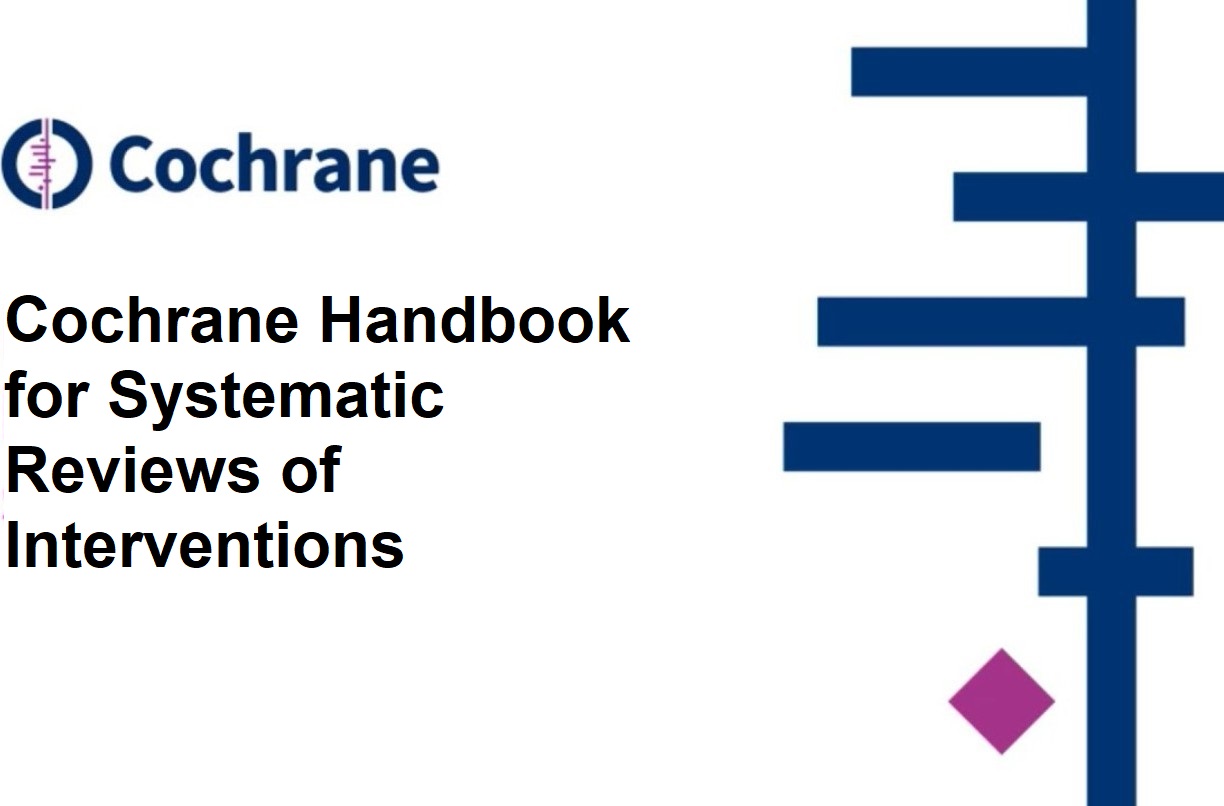The Cochrane Handbook for Systematic Reviews of Interventions is an authoritative guide designed to aid researchers in conducting systematic reviews of health interventions.
This comprehensive resource outlines the methodology and best practices essential for producing high-quality, reliable evidence. Here’s an in-depth look at its contents:
-
Introduction to Systematic Reviews
- Purpose and Scope: Defines systematic reviews and their role in evidence-based medicine. Explains the importance of minimizing bias and synthesizing data from multiple studies to guide healthcare decisions.
- The Cochrane Collaboration: Describes the organization behind the Handbook and its mission to improve health outcomes through high-quality evidence.
-
Planning a Systematic Review
- Formulating Questions: Details how to develop clear, focused research questions using the PICO framework (Population, Intervention, Comparison, Outcome).
- Protocol Development: Guidance on creating a review protocol, including setting objectives, defining inclusion and exclusion criteria, and outlining methods for data collection and analysis.
- Registration: Encourages registering the review protocol with databases like PROSPERO to promote transparency and reduce duplication of effort.
-
Conducting a Comprehensive Literature Search
- Search Strategy: Offers detailed strategies for developing and executing effective search strategies across multiple databases and sources, including PubMed, Embase, and others.
- Updating Searches: Provides guidance on updating searches to ensure the review includes the most recent studies.
-
Study Selection and Data Extraction
- Screening and Selection: Describes the process for screening studies based on predefined criteria, including initial screening, eligibility assessment, and resolving disagreements.
- Data Extraction: Instructions on how to systematically extract data from studies, including dealing with missing data and inconsistencies.
-
Assessment of Risk of Bias
- Risk of Bias Tools: Details tools such as the Cochrane Risk of Bias Tool to evaluate the methodological quality of included studies. Includes guidance on assessing various types of bias, such as selection, performance, detection, and reporting biases.
-
Data Synthesis and Analysis
- Quantitative Synthesis (Meta-Analysis): Provides methodologies for performing meta-analyses, including statistical techniques for combining study results, handling heterogeneity, and performing subgroup analyses.
- Qualitative Synthesis: Discusses methods for synthesizing data when quantitative analysis is not feasible, including narrative synthesis and thematic analysis.
-
Reporting and Interpretation
- PRISMA Guidelines: Outlines the Preferred Reporting Items for Systematic Reviews and Meta-Analyses (PRISMA) guidelines for structuring and reporting review findings to enhance clarity and reproducibility.
- Interpretation of Results: Offers guidance on interpreting findings, discussing limitations, and drawing conclusions based on the evidence.
-
Updating and Maintaining Reviews
- Review Updates: Provides recommendations on how and when to update systematic reviews to incorporate new evidence and maintain relevance.
- Managing Review Versions: Discusses managing multiple versions of a review and maintaining a record of changes.
Download Cochrane Handbook PDF: Click Here
Cochrane Library
The Cochrane Library is an online resource offering access to a range of high-quality, evidence-based health information. It is composed of several interconnected databases:
-
Cochrane Database of Systematic Reviews (CDSR)
- Content: Publishes systematic reviews and meta-analyses evaluating the effects of healthcare interventions. Each review is rigorously peer-reviewed and follows the methodologies outlined in the Cochrane Handbook.
- Scope: Covers a wide range of topics in health and medicine, including drug interventions, medical procedures, and public health measures.
- Updates: Regularly updated to include new reviews and revisions of existing ones.
-
Cochrane Central Register of Controlled Trials (CENTRAL)
- Content: A comprehensive database of randomized and controlled trials. Includes trials published in peer-reviewed journals as well as those in conference proceedings and other sources.
- Scope: Aims to capture studies from various sources that are not always indexed in other databases. Essential for identifying relevant trials for inclusion in systematic reviews.
-
Cochrane Methodology Register
- Content: Contains information on methodological research related to systematic reviews and meta-analyses. Includes guidelines, tools, and evidence on research methods.
- Scope: Supports researchers in improving review methodology and staying updated on best practices and methodological advances.
-
Cochrane Clinical Answers
- Content: Provides concise, actionable summaries of systematic reviews tailored for clinicians. Designed to offer quick access to evidence-based answers for clinical practice.
- Scope: Focuses on delivering practical information that can be used to inform patient care decisions.
Together, the Cochrane Handbook and Cochrane Library represent a cornerstone of evidence-based practice, supporting researchers and healthcare professionals in producing and accessing high-quality, reliable evidence to guide clinical decisions and improve patient outcomes.





